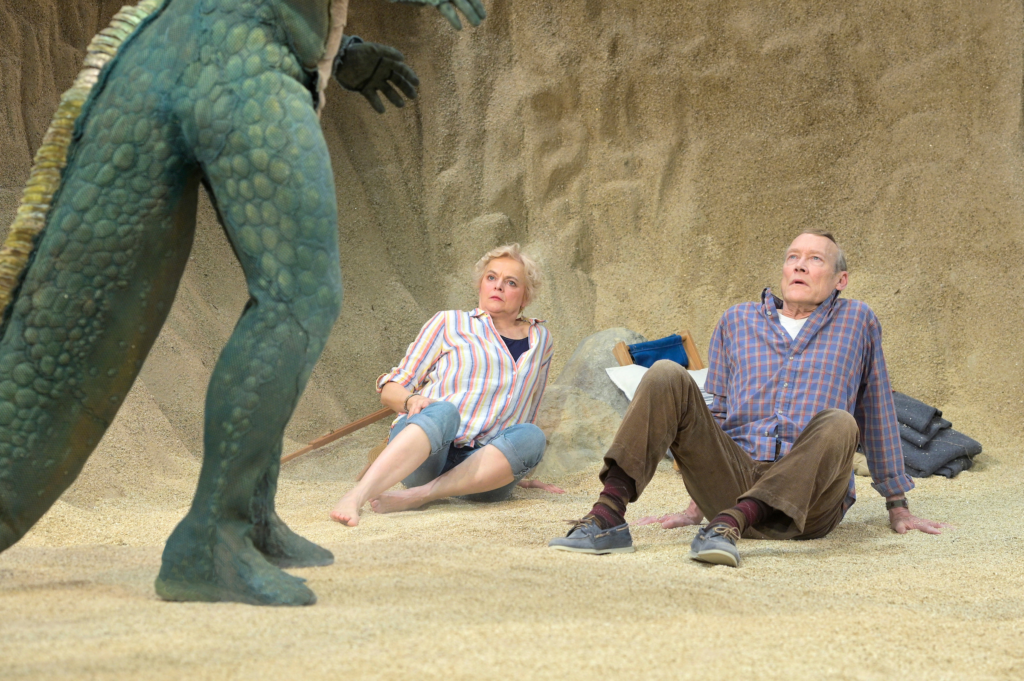
Nancy (Ellen McLaughlin) and Charlie (James Carpenter) in a state of joint terror.
(Photo: Kevin Berne)
Ontogeny recapitulates phylogeny. You may recall this catchy phrase from high school biology class. It’s the crux of a poetic 19th-century theory that the development of an embryo parallels the evolutionary development of its species, suggesting that each of us takes an in utero journey from primordial ooze to humanity. “Seascape,” Edward Albee’s Pulitzer Prize-winning 1975 play, is a crypto-comic riff on that E-train ride from Amoeba to Suburbia.
Now playing in a beguiling new American Conservatory Theater production helmed by A.C.T.’s new artistic director Pam MacKinnon, “Seascape” finds a human couple, long-married recent retirees Nancy (Ellen McLaughlin) and Charlie (James Carpenter), confronted with a pair of creatures who have exited at an earlier stop: giant lizards named Sarah (Sarah Nina Hayon) and Leslie (Seann Gallagher).
While the always word-besotted Albee graces Sarah and Leslie with the gift of English speech, their vocabulary and thought processes are simpler than those of their WASPy counterparts. The lizards are inclined to speak bluntly and act on instinct, while Nancy and Charlie ruminate, vacillate, regret and place blame. But Albee, more generous here than he often is to his fellow humans, also gives the warm-blooded couple some of our species’ more appealing cognitive abilities: nostalgia, introspection, aesthetics, romance.
Dotage-denying Nancy shares her author’s linguaphilia, and among the highlights of McLaughlin’s performance are antic semantic moments in which she demonstrates exquisite pleasure in comparing “cove” to “culvert,” or in the sonic quality of “petulance.”
We spend most of Act I with only Nancy and Charlie for company on David Zinn’s handsome set of sea grass and sand dunes, which pours over the lip of the stage and into the orchestra, aligning us with Team Human. Zinn, MacKinnon and Albee invite us to be a part of the play’s discussions, to recognize ourselves not as onlookers but as participants in the matters at hand. Nancy and Charlie ask each other — and each of us — what we’re meant to do with our lives as we grow older. Do we continue to somehow advance ourselves through achievement? Do we backtrack into childlike helplessness, or hopefulness? Is privileged White American Senior Citizenry the glorious endpoint of evolution?
In the face of Nancy’s go-go restlessness, it’s easy to understand how Charlie might feel exhausted. When he shrugs off her fantasies of never-ending travel and new experiences, he seems just as reasonable as curmudgeonly in suggesting, “We’ve earned a little rest.” But even when they bicker, having arguments we sense they’ve had a thousand times before, McLaughlin and Carpenter end up touching, glancing, or cutting a sentence short in a way that lets us know that this couple has built something positive and resistant to rupture.
The pair brings such three-dimensionality to Nancy and Charlie that when Sarah and Leslie emerge from the sea, they feel a bit flat. Not quite human. Which may be the point. With the help of movement coach Danyon Davis, Gallagher and Hayon have developed a fine-tuned physical lizardry; their initial expressions of alertness and fear match beautifully, heads dipping and haunches rising in tandem. But despite Sarah’s amusing description of her distinctive egg-laying impulses, the pair at first seem rather unindividuated within their species.
As they continue to interact with Nancy and Charlie, the production stumbles a bit. Albee is pushing against the boundaries of his conceit here. It’s unreasonable to expect him, or any actor, to portray reptilian consciousness with the nuanced authenticity he brings to the human kind. But the big green critters have a faint Flintstone aroma; they’re people-turned-cartoon more than creatures-not-yet-human.
Throughout “Seascape,” jumbo jets occasionally roar overhead, sweeping dark shadows across both couples, intimating another potential evolutionary outcome, technology-driven and tragedy-bound. Sarah and Leslie are terrified. In the play’s final scene they’re on the verge of returning to the sea when Nancy and Charlie offer to help them stay.
Edward Albee, always so precise with his words, knew what must happen after the curtain falls. Lizards, of course, even the marine iguanas on which he modeled Sarah and Leslie, are reptiles, not amphibians. On a grand scale, evolution dictates what’s next. We may be afraid. We may bicker over where we’re going. But there’s no turning back. We can only move forward.
Originally published in the Bay Area Reporter
